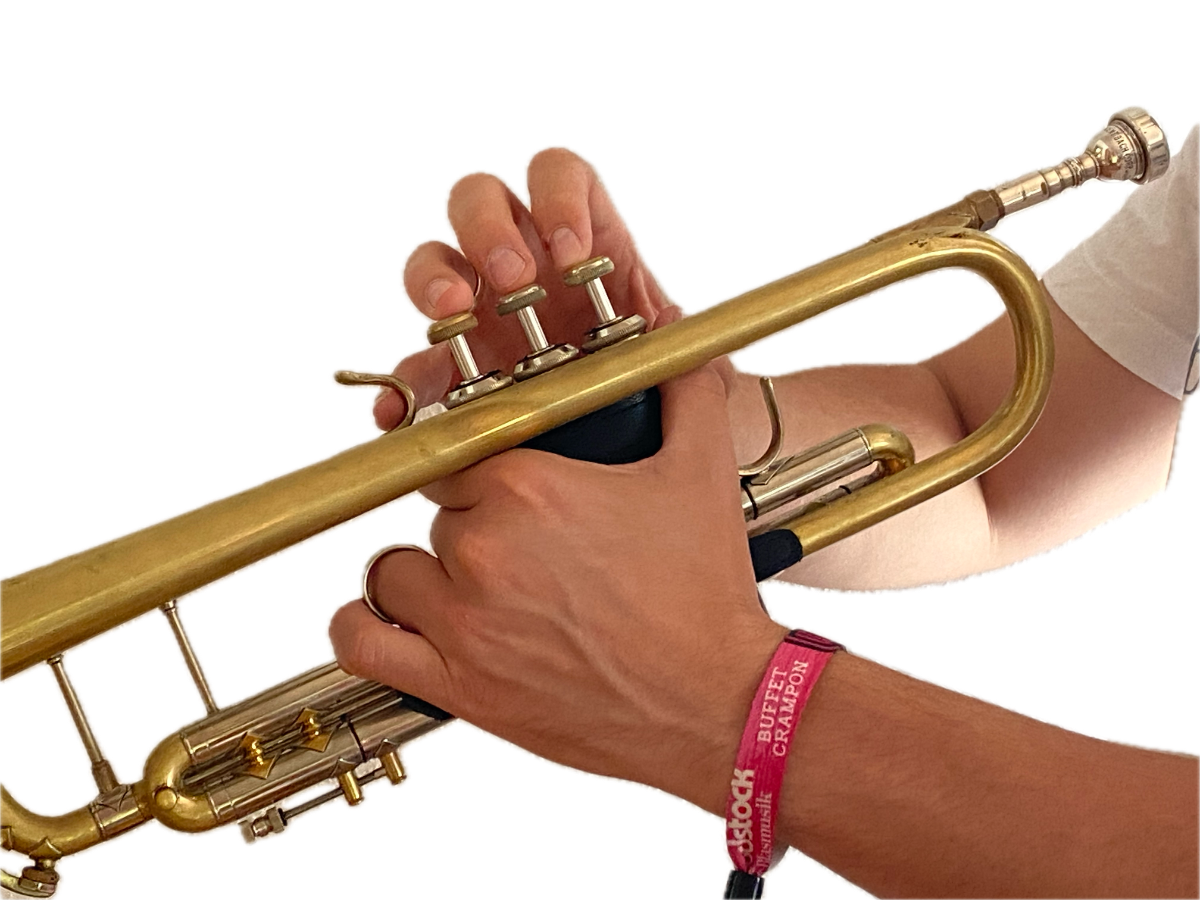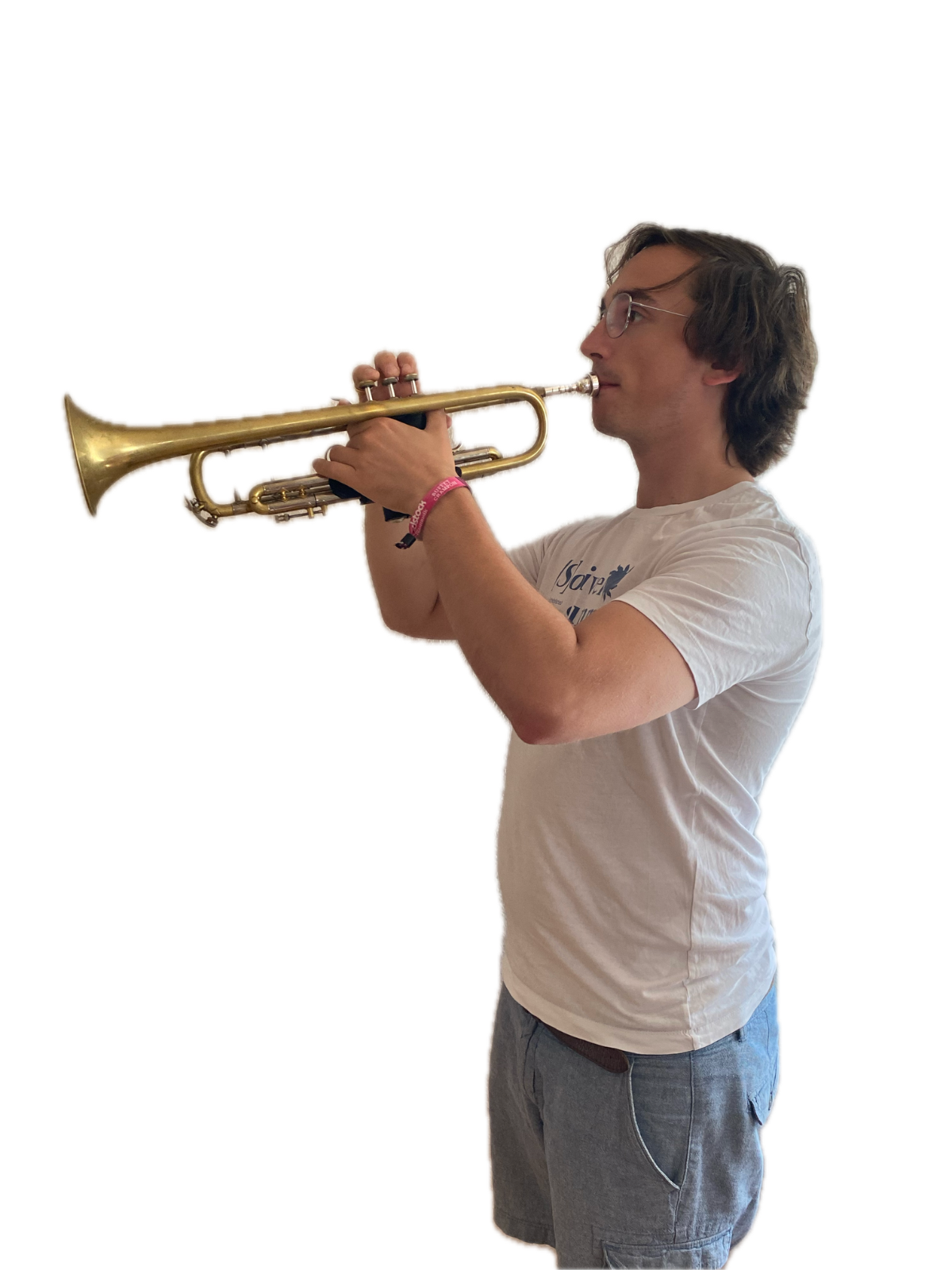Inhalt
How to start?
Now I'll show you how to hold the trumpet correctly, what posture you should adopt, and how to place the trumpet correctly against your lips!
Basically, however, I always recommend: just try it out and listen to your body to see what feels and sounds right and what doesn't.
If you have problems, take another look at the website and see what I or other trumpet players might be doing differently from you and try to adopt that for yourself.
A good comparison for a good mindset toward learning the trumpet is a child learning to walk: they will fall over again and again at the beginning and their first steps will be very wobbly, but the child doesn't care. It doesn't give up and just keeps watching the adults to see how they do it and tries to imitate them. Eventually, the wobbly steps become more and more confident and the child enjoys making progress until it can walk confidently on two feet.
So don't be too hard on yourself! Trust the process and have fun ;)

Lizenz: CC-BY-SA-4.0
- Stand upright and relaxed

Lizenz: CC-BY-SA-4.0
- Hold the trumpet as shown

Lizenz: CC-BY-SA-4.0
- Move your trumpet to your Lips, not the other way around!
Remember: stay relaxed, let your shoulders hang down.
... take a deep breath ...
... say the word Mhh ...
... put your mouthpiece on your lips and
.... try to produce a sound!
Try out different valves. If you find a tone, that sounds good and you feel relaxed at the same time, stay with this note for a while and play around with it
The following notes may come out of your trumpet:
Lizenz: CC0-1.0
Lizenz: CC0-1.0
Lizenz: CC0-1.0
Lizenz: CC0-1.0
Lizenz: CC0-1.0
Which one is your easiest note to play?
If you have trouble with this, maybe this video will help you to play your first notes:
Master Your First 5 Notes on Trumpet in 2 Minutes, 11 Seconds
Some Exercises
Stay with your easiest note for a while and do the following exercises
-
hold the note as long as possible
-
hold the note as long as possible in different dynamics (from very soft to very loud!)
-
start quietly and gradually become louder without changing the pitch! Now the other way around!
-
play different rhythmical pattern on this note
-
change articulation! Play very short, very smooth, very accented, ...
-
remove the mouthpiece from your trumpet and play this note only with your mouthpiece
-
play a piece of music that you have in mind just with this one note (e.g., Happy Birthday)
-
Now select another note that is also easy for you to play. Try all the notes again; it may now be a different note. Now repeat all the exercises on this note.
Listen to your body. Playing the trumpet can feel similar to speaking or singing, or it can be very strenuous if you play with too much pressure. Always try to make it feel as easy as possible.
Matthias Gleich
Lizenz: CC-BY-SA-4.0
How about some improvisation?
Exercises:
- Play around with these two notes (F and C)
- change the rhythm
- Use all the notes you can play so far for improvisation
- Make strange noises on the trumpet!
- Improvise only with your mouthpiece to the playback
And the most important thing: Have fun!
... if that is easy for you, maybe skip the next chapter or come back later on!
Although it contains important knowledge, it is important not to overload yourself with too much information at first. After all, we want to concentrate on making music, right?
Positioning of your lips / embouchure
The word embouchure means the positioning of your lips in the mouthpiece. There are some ways to find your right positioning - you have to try!
Here are some ideas:
1. The "Mmh"-Method
- Say "Mmh"
- Put your trumpet on your Lips
- Open your mouth to breathe in through the corners of your mouth - your lips should be "fixed" by the rim of the mouthpiece
- Try to produce a sound by saying the word "poo"
- Make sure you're lips stay in the same position while playing
Video: Nancy Taylor explains how to Form an Embouchure
2. The Charlie Porter Method
- hide the red
- create the seal
- open the lips
- wet the lips and blow
Video: How To Form a Trumpet (brasswind) Embouchure in Four Steps, by Charlie Porter
3. How it May Look Like
How To Set Your Embouchure, CC BY-SA Matthias Gleich
Lizenz: CC-BY-SA-4.0
Quelle: YouTube
Call and Response means:
Listen the first four beats, then play in the second bar
Playing slowly and accurate is a very effective way to improve your trumpet playing.
Matthias Gleich
Lizenz: CC-BY-SA-4.0
Matthias Gleich
Lizenz: CC-BY-SA-4.0
Matthias Gleich
Lizenz: CC-BY-SA-4.0

Quelle: Wikimedia

Lizenz: CC-BY-SA-4.0
Searching for Notes
One Note Song Playback
Lizenz: CC-BY-SA-4.0
One Note Song C
Lizenz: CC-BY-SA-4.0
One Note Song F
Lizenz: CC-BY-SA-4.0
Trumpet Reggae Playback
Lizenz: CC-BY-SA-4.0
Trumpet Reggae Trumpet
Lizenz: CC-BY-SA-4.0
Exercise 1
Lizenz: CC-BY-SA-4.0
Exercise 2
Lizenz: CC-BY-SA-4.0
Exercise 3
Lizenz: CC-BY-SA-4.0
